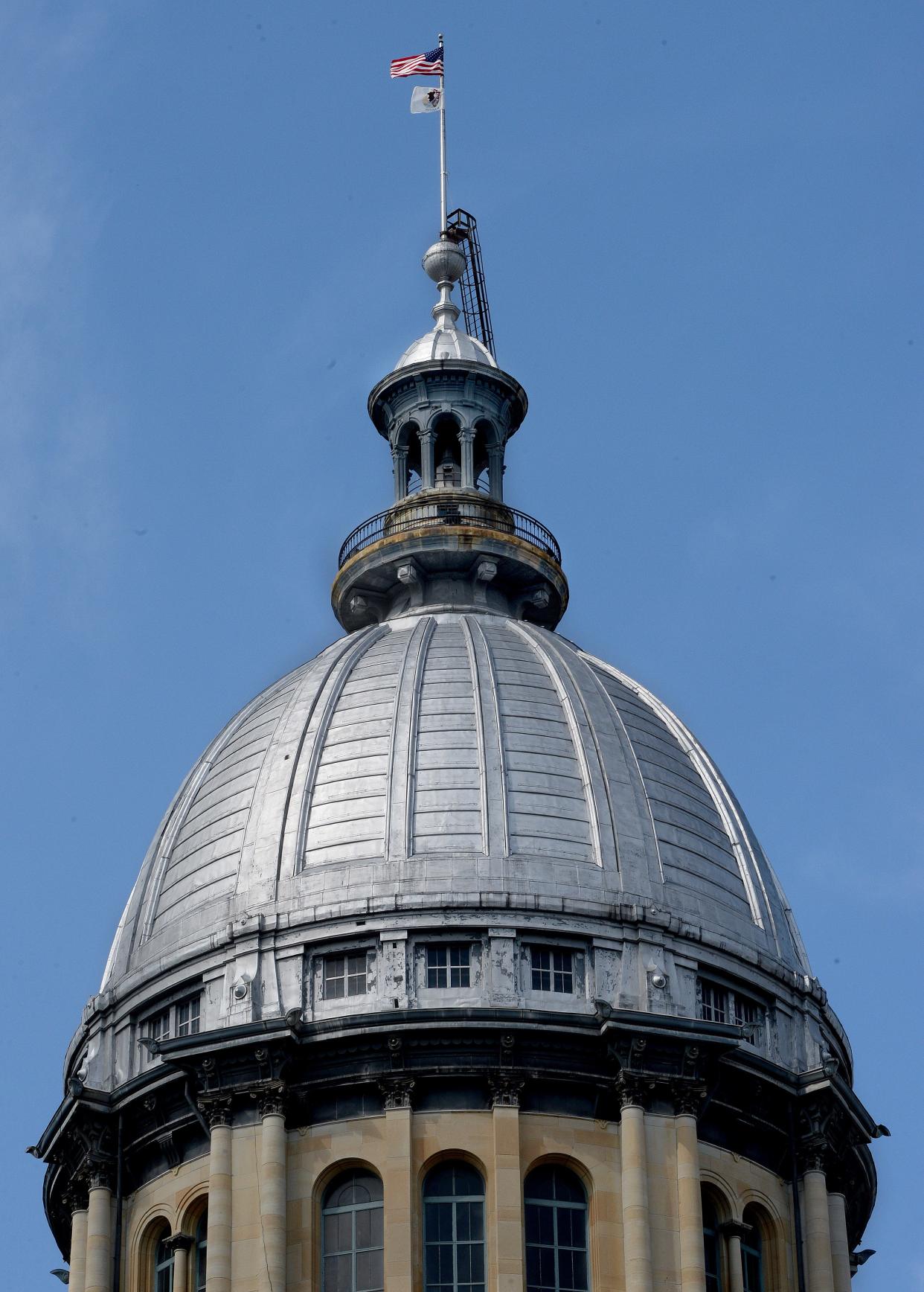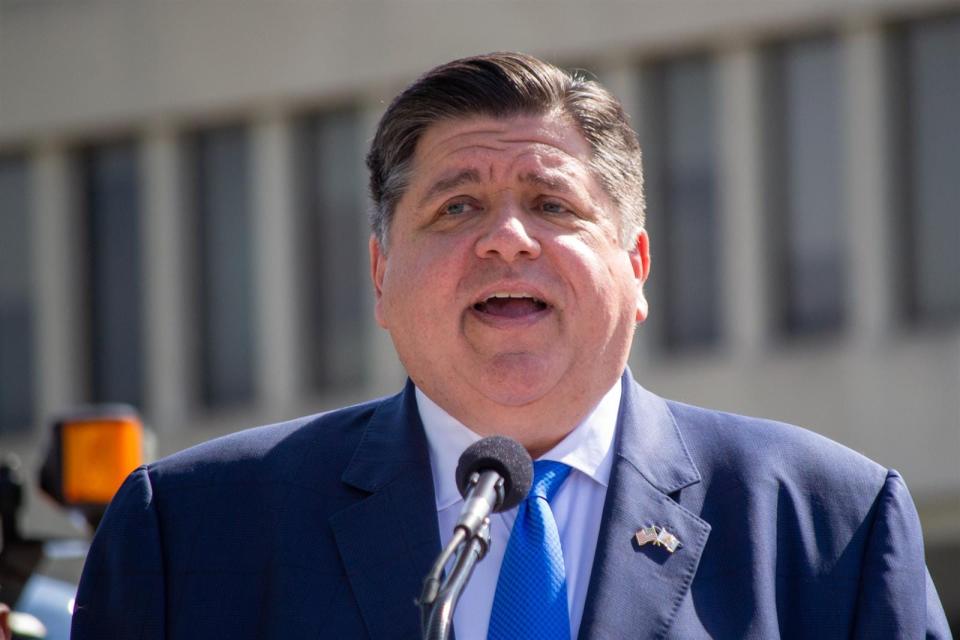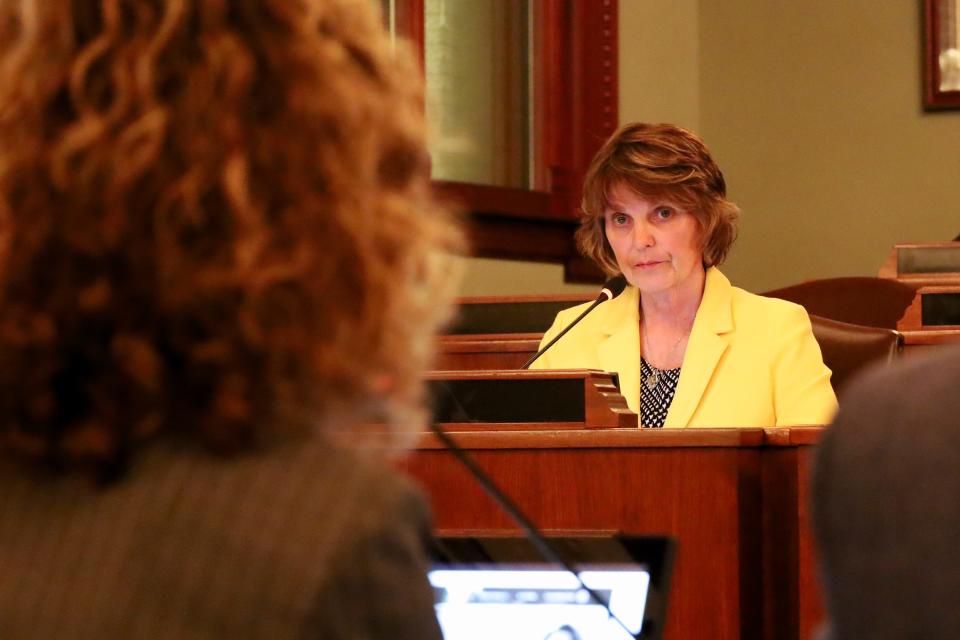Lawmakers return to Springfield for six-day veto session

- Oops!Something went wrong.Please try again later.
The Illinois General Assembly heads back to Springfield next week, kicking off the final six-day stretch for legislative business before the new year.
Lawmakers will return over the course of three weeks − divided by Halloween − meeting first between Oct. 24 and 26 and then from Nov. 7 to Nov. 9. Their tasks will be to address bills vetoed by Gov. JB Pritzker along with some outstanding and newly introduced legislation.
Unlike the spring session, all legislation must pass with super-majorities − 71 votes in the House and 40 votes in the Senate − to go into effect immediately. Democrats have those numbers, meaning if all of its members vote for a bill it will move to Pritzker's desk.
Amid the beginning of the 2024 campaign season, there is some indication of lawmaker priorities for the brief, often breakneck-paced session.
![Illinois House Speaker Emmanuel "Chris" Welch talks about the inditment of former Speaker Michael Madigan at the State Capital Wednesday March 2, 2022. [Thomas J. Turney/ The State Journal Register]](https://s.yimg.com/ny/api/res/1.2/vdGmmtWd5CbDyBrukJt6cA--/YXBwaWQ9aGlnaGxhbmRlcjt3PTk2MDtoPTY3Mw--/https://media.zenfs.com/en/the-state-journal-register/05bc43fcb64bdb889ea1551aaad6dc0d)
For House Speaker Emanuel "Chris" Welch, that includes his bill to allow legislative staff to form a union and engage in collective bargaining. Fellow Democrats also pushed an array of legislation this summer, including granting people incarcerated the ability to vote and establishing a student-athlete bill of rights.
More: Illinois House Speaker Welch introduces bill to allow legislative staff to unionize
Several committee sessions in Chicago over the summer revealed a chance for bipartisan movement with pension reform, specifically regarding public employees hired after 2011. Republicans, however, will likely not gain traction with renewed calls for ethics reform following a guilty verdict delivered to former House Speaker Michael Madigan's ex-chief of staff Tim Mapes in August.
Also doubtful is spending beyond the previously earmarked $42.5 million to deal with the growing number of asylum seekers in Illinois. The Chicago Bears have also declined any indication that they would be seeking state funds for a new stadium, according to The Chicago Tribune.
Overriding Pritzker's vetoes
More than 560 bills passed by state lawmakers during the January to May session have been signed into law by Pritzker. At the same time, the governor has also issued three vetoes and three amendatory vetoes.
One vetoed bill would have ended the state's 35-year moratorium on nuclear reactor construction, a decision Pritzker said he made because it lacked "regulatory protections for the health and safety of Illinois residents." Bill sponsor Sen. Sue Rezin, R-Morris, has already filed paperwork to override the veto. Her bill received bipartisan support during the spring session.

In a move placing "corporate profits over consumers," the governor issued an amendatory veto on House Bill 3445. The energy omnibus consisted of several portions, many of which Pritzker wants to keep as is, but is against a provision allowing existing utilities in the Midcontinent Independent System Operator region a transmission line construction monopoly.
Rep. Larry Walsh, D-Elwood, the bill sponsor, will also push the legislation in the upcoming session. He has said the bill is in the best interest of downstate workers, while environmental groups supported the governor's veto.
Invest in Kids
Perhaps its signature rallying cry during the May budget vote, Republicans have continued calls to continue a tax credit program for students hoping to attend private school.
The Invest in Kids tax scholarship program, an initiative of former Gov. Bruce Rauner, is set to expire at the end of the year after not being included in the fiscal year 2024 budget. The credit provides tax credits of 75% to individuals and businesses who donate to scholarship organizations up to $75 million per year.
More: Springfield school with mentally and emotionally disabled students ordered to shut doors
Members of the minority party are holding out hope that the legislature could continue the program, even bringing in former Mrs. America Nicole La Ha to the cause.
Incoming Seventh Judicial Circuit associate judge Dan Wright previously testified before the Illinois State Board of Education, advocating for the program.
"The data is clear – investment in early childhood education reduces the likelihood that vulnerable children become justice −involved later in life," he said earlier this month.
Healthcare accountability

Rep. Sue Scherer, D-Decatur, is again taking up a measure that she says will hold insurance companies accountable for underdelivering on promised medical care.
For Scherer, the legislation is critical in addressing "ghost networks," where healthcare provider lists from insurance companies are inaccurate − causing delays in care for some patients. Oftentimes, she said patients think their doctor is in-network only to find out they are only available for Medicare or Medicaid patients.
"If they're paying for a service, then they should receive that service," she said Wednesday. "And if the company they're paying for it from chooses to take the service away, then they should have a consequence."
House Bill 4126 would address the directory-listing issues by setting a $5,000 per month fine when a company fails to update its provider list. If a company decides it is no longer accepting patients, it must provide notice within five days of the decision.
Additionally, the Illinois Department of Insurance would receive broader emergency rule-making ability through the bill to establish federal-level standards for travel time and distance, provider ratios, and appointment wait times if they exceed those of the state.
The bill stems from a dispute between Blue Cross Blue Shield of Illinois and Springfield Clinic. Anywhere from 55,000 and 110,000 people were forced to find new doctors when the two ended their contract. Since then, Blue Cross has received two fines totaling about $1 million last year for violating the Network Adequacy and Transparency Act.
Scherer had received bipartisan support with similar legislation last year but it failed after some legislators said the bill went too far.
Rent control
With rent on the rise nationwide, amid a housing shortage, advocates are getting behind a bill that would open the door for rent control in municipalities throughout the state.
House Bill 4104 would create the Let the People Lift the Ban Act and would amend a 1997 law that prevents any unit of local government from controlling rent prices. Effectively, the Rent Control Preemption Act would still be in place if the bill is signed into law, but, with a voter referendum approving rent control, the prohibition would not apply to that municipality.
More: Bill regulating cryptocurrency stalls, possibility remains for veto session
The bill from Rep. Hoan Huynh, D-Chicago, was the topic of discussion for a town hall earlier this month hosted by Faith Coalition for the Common Good. Quentora Dumas, a Springfield renter, said the legislation could bring needed stability to many who are struggling to make ends meet.
"We have people who are working full-time jobs and two jobs who can't make rent," she said during the town hall held at the Monroe Street Christian Church.
Similar attempts at establishing rent control in the state have been made in recent years with the most recent attempt never making it to a full floor vote. A lobby day at the Capitol has been scheduled for Wednesday.
Karina's bill
Following a domestic violence shooting in a Chicago neighborhood this summer, advocates are hoping a bill will receive a vote in the Illinois Senate.
Law enforcement would take firearms away from a home if a domestic violence survivor receives a protection order through House Bill 676, deemed Karina's Bill. The bill received that name following the deaths of Chicago resident Karina Gonzalez and her 15-year-old daughter Danielan − allegedly shot by Gonzalez’ husband Jose Alvarez after she was granted an order of protection against him.
State law currently permits a victim to request their abuser's Firearm Owner Identification card to be revoked and allows for those weapons to be turned over to anyone with a valid FOID card. Passage of the bill would transfer the firearms to local law enforcement within 48 hours of a protection order being filed.
The bill passed in the House 70-36 in May and is in the Senate assignments committee. It also would create a task force to study policy for firearm insurance.
Reporter Andrew Adams of Capitol News Illinois contributed to this report.
Contact Patrick M. Keck: 312-549-9340, pkeck@gannett.com, twitter.com/@pkeckreporter.
This article originally appeared on State Journal-Register: Illinois General Assembly to tackle nuclear moratorium, rent control

